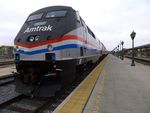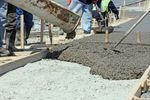2022 Regional Legislative Priorities - Hampton Roads ...
←
→
Page content transcription
If your browser does not render page correctly, please read the page content below
2022 Regional Legislative Priorities
for the
757
Coastal Resiliency
• Create the Virginia Commonwealth Flood Board (CFB).
• The challenge of flooding is a
statewide issue which requires the
needed resources, staff and
organizational structure to ensure
that Virginia can address this issue
in an ongoing, holistic and
collaborative manner.
• The CFB would direct and prioritize
state and federal funding for flood
mitigation, ensure collaboration and
alignment among State agencies,
and coordinate flood mitigation
planning and adaptation efforts.
• The CFB would be similar to the Commonwealth Transportation Board which meets on a regular
basis to address transportation needs and issues in Virginia. The CFB would serve a similar role
for statewide flooding issues.
• Support efforts to mitigate the impact of the
Downtown and Midtown Tunnel Tolls on our
Region’s residents and businesses.
• Current toll agreement has significant
impacts on the residents and businesses
of the Hampton Roads region.
• Data shows that these tolls are having a
regional impact.
• HRTPO has established an ERC Task
Force to work with the Commonwealth on
potential strategies to address this issue.
• Explore all options to reduce toll rates for
our residents and businesses.• Sustain efforts to support and promote the
offshore wind industry and make the Hampton
Roads region a hub for supply chain jobs to
support this emerging industry.
• The region’s geographic location, harbor and
specialized workforce position the 757 to be the
hub to support wind turbines planned for
construction along the east coast.
• Request that the General Assembly establish the Offshore Wind Supply Chain
and Workforce Development Fund to assist Hampton Roads companies in their
efforts to participate in the offshore wind supply chain. This fund would be used
by companies to offset some of the costs to support this emerging industry.
Funds could be used for worker training/certification, new product development
or repositioning, equipment upgrades, and implementing new operational
processes to support offshore wind.
• Support funding programs and policies that assist
local governments with preparing shovel ready
sites for economic development and job creation.
• The Hampton Roads region has utilized funding
through the GO Virginia program to advance
regional economic development sites through the
Tier-system utilized by the Virginia Economic
Development Partnership (VEDP).
• This regional approach has been viewed as a
model program in Virginia for preparing shovel-
ready economic development sites.
• Important to support the continuation of funding for
programs that support regional efforts to advance
economic development site readiness.
2• Request State/Federal funding to finish the I-64 Gap between
Hampton Roads and Richmond.
• The Hampton Roads region has completed three phases of
I-64 improvements on the Peninsula to west of
Williamsburg using predominantly local/regional tax monies
through the Hampton Roads Transportation Accountability
Commission (HRTAC).
• The Commonwealth has completed improvements between
I-295 near Richmond eastward to the Bottoms Bridge Road
interchange.
• A 29-mile gap exists that must be improved to ensure a
reliable transportation connection between Hampton Roads, Richmond and the I-95 corridor.
• The estimated construction cost for the Gap is between $600 and $700 million.
• Approximately 20 of these miles are located outside of the Hampton Roads region.
• Completing this gap is critical to support our military, the Port of Virginia and the
Commonwealth’s tourism economy.
• The completion of the I-64 Gap is also supported by the RVA/757 Megaregion, and is
consistent with goals for completing an I-64 Innovation Corridor between Hampton Roads
and Richmond.
3• Support funding programs and
policies that advance regional efforts
to develop interconnected and
modern fiber networks.
• The Hampton Roads region is
planning a fiber network that will
connect to the subsea cables that
have come ashore in Virginia
Beach and spread this ultrafast
service throughout the 757 region.
• The first phase of this effort is the
southside fiber ring – the procurement process is currently underway for the construction of
this fiber ring. The next phase of this effort will expand this fiber network to the Peninsula.
• Current State funding programs for broadband place priority on last mile service to rural
areas.
• State funding programs should include funding opportunities for middle mile/dark fiber
networks that support urban, suburban, and underserved areas.
• As automobiles become more efficient and electric vehicles become more prominent, the amount of
gasoline purchased is expected to decline.
• It is expected that the gasoline tax will continue to diminish as a viable funding source for needed
transportation improvements.
• Support the identification of alternative funding sources for transportation improvements.
4• Planning District Commissions (PDCs) play a critical role in coordinating regional cooperation and
strategies that strengthen our regional economies and improve the quality of life for the
Commonwealth of Virginia.
• PDCs also serve a critical role
by supporting state agencies in
program and project delivery
which results in cost savings for
the Commonwealth of Virginia.
• In FY 2022, the HRPDC
receives $165,943 as a base
allocation from the Commonwealth of Virginia. While this amount represents a $14,000 increase, it is
more than $200,000 less than the HRPDC received from the Commonwealth in 2001.
• State funding should reflect the critical role that PDCs play within their regions and the support and
cost savings PDCs create for the Commonwealth of Virginia.
• Experiences over the past 18 months
illustrate that electronic meetings can
increase public participation and
reduce the need for travel.
• Current provisions within the Code of
Virginia are very restrictive regarding
the ability of public and regional
bodies to conduct electronic/virtual
meetings outside of a declared State
of Emergency.
• While the importance of in-person meetings is recognized, the General Assembly should consider
providing increased flexibility for public bodies and regional bodies to hold electronic/virtual
meetings, when deemed appropriate.
5• Support legislation to provide local
governments with local option/authority in the
reforestation, preservation, and management
of urban forests.
• Urban forests play an important role to capture
and store carbon, reduce stormwater runoff,
improve air quality, reduce energy use, and mitigate urban heat islands and their health effects.
• Support the continuation of efforts
to appropriate funding for housing
programs and projects.
• Review enabling legislation at the
State level to ensure that all
localities have consistent local
option/authority to implement tools
such as inclusionary zoning and
impact fees.
• The region supports park and conservation efforts, but a more related funding source is more
appropriate. No connection between solid waste fee/tax and parkland or conservation efforts.
• Concept is also opposed by the Southeastern Public Service Authority (SPSA).
6• In response to excessive costs, unreliability of
services and an overall decline in readership of
print newspaper, localities are seeking
alternative methods to provide public notice that
reflect current trends, are more effective, and
are more cost efficient.
• Request that the Joint Legislative
Audit and Review Commission
(JLARC) evaluate the structure and
resources for Public Health
Districts.
• Evaluate lessons learned from the
COVID pandemic and recommend
improvement strategies for
Implementation.
• Address challenges on a regional
level
7• Sustain UASI funding levels for the Hampton Roads region.
• Support the continuation of efforts to provide increased
state funding for K-12 public education.
• Evolving technology and facility needs require funding to
ensure that our K-12 facilities remain modern and can
meet today’s public education best practices and needs.
• Support efforts and projects that promote higher
speed passenger rail service between Hampton
Roads, Richmond and the Northeast Corridor.
• The 3rd train to Norfolk is scheduled to begin in
Spring 2022.
• Newport News Multimodal Center is due for
completion in Spring 2023, with the 3rd train to
Newport News arriving in 2026.
• Improved passenger rail service will decrease traffic
on I-64 and benefit the military and Port of Virginia,
but we must improve the timing and reliability of this
service.
• Request assistance from the Commonwealth and
Virginia Passenger Rail Authority to provide
enhanced service between Hampton Roads and
Richmond.
8You can also read



























































